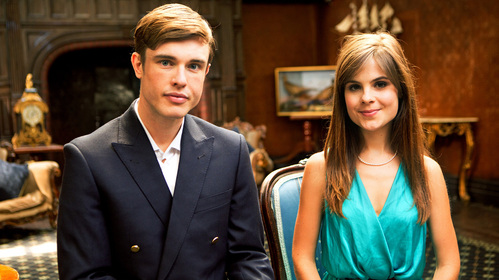|
On Saturday, BBC America began its new series, Almost Royal, a satrical documentary in the style of Borat, though far gentler and more affectionate. It follows the first-ever trip to America of sister and brother Poppy and Georgie Carlton, who we are told are 50th and 51st in line for the Crown, as they follow their late father's last wish and discover the colonies. It's not correct to call them dim, or twits or clueless. Perhaps devastatingly-sheltered, though well-meaning might be closer. (When renting a car in Los Angeles, the show's first stop, Georgie points to the front and tells the salesman, "In England, we call these headlights.") Georgie seems game for most anything, though out of his depth -- participating in a Revolutionary War enactment, for example (quite enthusiastically, in fact) crying out, "Die you American pigs," whenever firing his musket. Poppy is willing to get involved, mainly as long as it involves attention or not working. When in Los Angeles, where it's clear their favorite actor is Rick Moranis, they visit the set of The Bold and the Beautiful -- meeting the casting director and Poppy gamely reads a scene, After getting some thoughtful suggestions, like acting lessons, she notes that when she gets hired for the role, she'd be willing to get some training. It doesn't makes sense to do it the other way around. When on a bicycle tour of L.A., they say they'd like to see some old architecture. The Playboy Mansion is suggestion to them. "Oh, is that where that old man lives with his daughters?" Poppy asks wide-eyed? When it's politely explained that, no, they're friends with...er, benefits, a cheerful Georgie wanting to show himself a man of the people happily chimes in uncomprehendingly that he and Poppy aren't just brother and sister, but friends, with benefits, too. The bemused guide clarifies that...um, oh, no, they're not. That's not the benefits he means. But a petulant Poppy insists back, "Oh, yes, we are." One of the my favorite sequences (even if it's more dry than laugh out-loud funny) is when the siblings visit Boston and want to learn about the Revolution, so they go to a meeting of the Tea Party Society. As you might imagine, it's not the Tea Party they think, but of the more recent far-right political variety. And when Georgie asks if he might give a speech, he pulls out his note cards and launches into a long talk (so long they the filmmakers have to cut it into a near-endless montage) that compares England outlawing hunting to the game of cricket. This includes him naming all 11 members of his cricket team -- including Duffy Scrunton and Hugo Frogsworth -- and making connections that Sherlock Holmes would have a hard time explaining, not only between hunting and cricket but between anything and those topics. All the while the camera shows the bewildered, utterly bored, yet polite audience listening. (Or not listening, eventually.) Later, Poppy asks one of the members what her "favorite bits" are in the Constitution and then later, in as perturbed as she gets, notes that no tea was served all night. Two favorite lines stick out. One occurs in Los Angeles when going to the office to a famous plastic surgeon, and Poppy asks him, "Can you make me look less like my mother?" The other comes in Boston where a college historian is explaining to brother and sister the story of Paul Revere and then when their visit with the professor is over, they walk off and Georgie waves behind him, "The British are leaving." (During their conversation, they complain that, since Revere was British, he was a bit of a "snitch," wasn't he?) The show doesn't all work. I'm not a big fan of making fun of the unsuspecting, though happily this does little of that. The people they come in contact with are rarely made to feel uncomfortable -- besides, as aristocrats they have a certain noblesse oblige to treating others well, and the naivety of the Carltons is as much the butt of the joke. What makes the show charming to watch is the work of Ed Gamble and Amy Hoggart. Both are supremely talented, even if not greatly known on either side of the pond. (A Wikipedia search for Ms. Hogarth turns up the question, "Do you mean: Amy Zegar?") He is a stand-up comedian with a charming, open and quick way about him. She is a diminutive comedian and actress who has several alter-egos, including stand-up comic (who performs in actual clubs) named Pattie Brewster who has written a book on happiness, but admits to "straddling the line between small and creepy."
It's deft and subtle work. It's no easy trick to be effete, elitist, soft and out-of-touch, and yet come across as deeply engaging and warm, as Gamble does. And to be self-centered, beautiful and lazy, and not come across as a cold, distant...er, witch, but rather well-meaning and friendly, as Hoggart does. In the end, it's more they're sort of like baby swans who've wandered into the wrong place, and their guides feel protective of them, even while they might be squawking The show airs on BBC America on Saturday nights, though for all I know may be repeated during the week. (Alas, for anyone reading this in the actual land of the BBC, the series doesn't yet appear there. Perhaps England will get the program soon -- sorry, programme. Or not.)
0 Comments
Leave a Reply. |
AuthorRobert J. Elisberg is a political commentator, screenwriter, novelist, tech writer and also some other things that I just tend to keep forgetting. Feedspot Badge of Honor
Categories
All
|
|
© Copyright Robert J. Elisberg 2024
|







 RSS Feed
RSS Feed